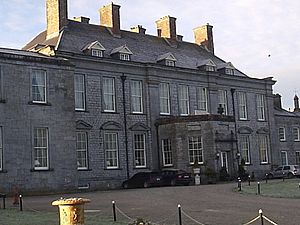William Flower, 1st Baron Castle Durrow facts for kids
William Flower, 1st Baron Castle Durrow (born March 11, 1685 – died April 29, 1746) was an important Anglo-Irish person. He was a peer, which means he held a special noble title, and also a politician, meaning he was involved in government.
William Flower's Early Life and Family
William Flower was the only son of Thomas Flower and his first wife, Mary Temple. His mother's father, Sir John Temple, was a very important person who led the Irish House of Commons, a part of the Irish government.
William went to Christ Church, Oxford University to study. When his father passed away in 1700, William inherited his family's lands and wealth.
In 1717, William Flower married Edith Caulfeild. They had two daughters and two sons. One of their daughters, Rebecca, married James Agar, who was also a well-known politician from County Kilkenny. Rebecca and James had six children.
William Flower passed away in 1746 when he was 61 years old. He was buried in Finglas in County Dublin. His son, Henry, inherited his father's title. Henry later became the first Viscount Ashbrook in 1751.
William Flower's Political Career
William Flower was a Member of Parliament (MP) for County Kilkenny from 1715 to 1727. An MP is a person chosen to represent a certain area in the country's government.
After that, he represented Portarlington until 1733. In 1733, he was given the special title of "Baron Castle Durrow". This made him a peer, a member of the nobility.
In 1731, William Flower became the High Sheriff of County Kilkenny. A High Sheriff was a very important official who helped keep law and order in the county. In 1735, he joined the Privy Council of Ireland. This was a group of trusted advisors to the King or Queen in Ireland.
William Flower owned a large property in Wales. He inherited it from his stepmother, Dorothea Jeffreys. She was a wealthy Welsh woman.
He also built a grand house called Castle Durrow in County Laois, Ireland. This became his main home in Ireland, and his family lived there until 1922.
The famous writer Jonathan Swift once said that William Flower was "a gentleman of very good sense and wit."
Images for kids
 | Bessie Coleman |
 | Spann Watson |
 | Jill E. Brown |
 | Sherman W. White |



